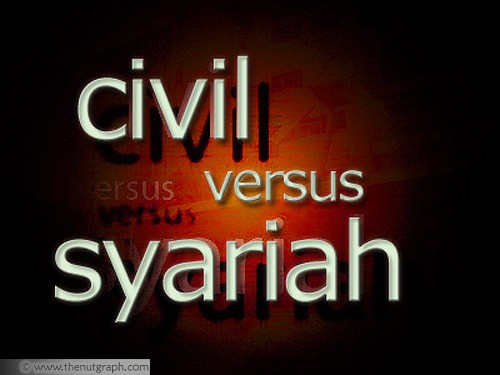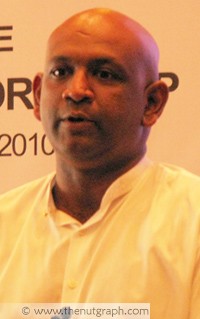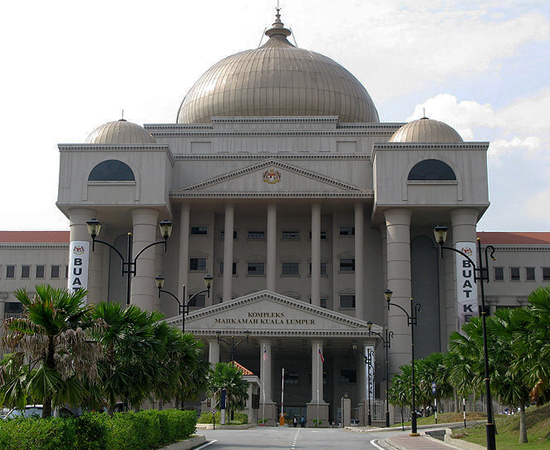
Corrected 11.35am on 25 Aug 2010
ON 20 Aug 2010, a three-person bench of the Court of Appeal unanimously denied the application of S Kaliammal, the widow of Mount Everest climber M Moorthy, to determine her late husband’s religious status. Moorthy passed away on 20 Dec 2005 after entering into a coma. Just before his death, Kaliammal was informed he had converted to Islam. Upon his death, the Islamic religious authorities claimed Moorthy’s body for a Muslim burial after the syariah court issued an order declaring him Muslim.
Kaliammal has been fighting for the civil court to determine Moorthy’s religious status, saying he professed to be Hindu shortly before his death. In her judgment, however, Justice Datuk Zainun Ali said the syariah court was the competent authority to determine any matter relating to the conversion to, or renouncement of, Islam. She also said Kaliammal could apply to the syariah court to set aside the order declaring Moorthy a Muslim.
Is it just and reasonable to ask a non-Muslim to go to the syariah court to seek a remedy? The Nut Graph asks lawyer K Shanmuga, who represented Mohan Singh‘s family in a similar case, about the implications of this Court of Appeal decision.
TNG: What are your comments on the Court of Appeal’s decision that the religious authority of a particular religion is better placed to consider whether a person belongs to that religion?
K Shanmuga: Usually, what we are asking the court is to decide what religion a person professed and practised. This is different from what religion he or she is. What they professed involves what they told others about their beliefs and what they acknowledged themselves to be.
In Moorthy‘s case, for example, 11 days before he fell into a coma, he appeared on a TV3 interview explaining how he was going to celebrate Deepavali that year. This was raised in court. The issue is not whether he’s Hindu under Hindu law or Muslim under Islamic law. It’s a question of what he professed himself to be.
What are the effects of the Court of Appeal judgment on Kaliammal and others in a similar position?
Firstly, Kaliammal is denied access to justice. Basically, she’s been told the court cannot help her and can’t even hear her application. They apparently said she can go to the syariah court. But this overlooks the Federal Court decision in R Subashini‘s case, which categorically said non-Muslims cannot go to the syariah court even if they wanted to. The constitution has defined the syariah court’s limits and we cannot enlarge it. So Kaliammal now can’t go to any court for a remedy for this situation.
Financially, in Kalliamal’s case, some settlement was reached in terms of inheritance from Moorthy‘s estate. In most other cases, because the court refuses to hear them, the widow and family are totally disinherited. The entire estate will go to the state Islamic department under faraid because there would ordinarily be no Muslim relative. Or if the deceased has a new Muslim family, they will inherit over the non-Muslim family. The non-Muslim family’s entire financial security could be taken away from them by being denied access to court.

Justice Zainun said Article 121(1A) of the Federal Constitution places the determination of Moorthy’s religious status with the syariah court. The article states that the civil courts will have no jurisdiction over matters within the syariah court’s jurisdiction. Does that preclude the civil courts completely from deciding on matters such as Moorthy’s religious status?
The Federal Court decision in the Latifah Mat Zin case states that the civil court must examine the various state enactments on whether jurisdiction was given to the syariah court on a particular issue. In Moorthy’s case (which was in the Federal Territory), the Federal Territories legislation at the time did not give the syariah court jurisdiction to determine a Muslim’s religious status.
The Latifah Mat Zin case also states that even if the syariah court had jurisdiction to hear the matter, such as in Selangor after 2003, even then, all parties must be Muslim. If there was a contest between the Islamic department and a non-Muslim family, the syariah court cannot have jurisdiction. Both conditions must be satisfied – namely, the law must expressly grant the syariah court jurisdiction over the dispute, and everyone in the dispute must be Muslim.
(Copy corrected: comment removed because of editorial error)
Why can’t non-Muslims go to the syariah court for relief, as the Court of Appeal suggested to Kaliammal?
The reason why non-Muslims cannot go to the syariah court is simple. Syariah derives its legitimacy from theological law – the Quran and Hadith. This is legitimate for Muslims because they believe it’s the revealed word of God.
Non-Muslims don’t share that belief. We cannot ask non-Muslims to be judged according to a theological law they don’t believe in. Syariah has no legitimacy to them as non-Muslims.
The second point is the constitution just doesn’t allow for it. The courts can’t say, “Why don’t you go there?” That’s up to the people, through Parliament, to decide whether they want to amend the constitution. There are also problems of practicality and perception such as non-Muslim evidence carrying less weight in certain areas. But the basic fundamental reason is that syariah has no legitimacy for non-Muslims.
Article 121(1A) was meant to prevent Muslims who had their matters litigated in the syariah court from coming to the civil courts for a second bite at the cherry. It wasn’t meant to impose Islamic law on non-Muslims, which is the effect of the 20 August Court of Appeal decision.
What should the remedy be to ensure Kaliammal and others in her position have access to justice? Do the civil courts have to step up and assume their proper jurisdiction or must the law be amended?
I think because there have been so many cases and so much uncertainty, ideally, the law ought to be amended to make things clear. The Malaysian Consultative Council of Buddhism, Christianity, Hinduim, Sikhism and Taoism (MCCBCHST) signed a 2007 Note of Protest setting out comprehensively what needs to be amended.
Effectively, they say Article 121(1A) can stay. But they suggest it may also be useful to say that the syariah court should not interfere where non-Muslim rights are affected.
It’s also important to make it clear that the determination of who is a Muslim should belong to that person. Provisions such as in Selangor, which give the syariah court jurisdiction to make that determination, should be removed. Definitions of who is a Muslim should also be removed.

At the moment, such definitions in state enactments go beyond the constitution, which says Islamic law applies to “persons professing the religion of Islam”. State enactments define it wider; for example, by stating that a person born to a Muslim or person who converts to Islam is a Muslim for all time.
The problem is the courts have made Article 121(1A) into something it was never intended to be. It was just intended for Muslims who have had their disputes litigated in the syariah courts and were dissatisfied, trying to get a second bite at the cherry in the civil courts. It was to stop that practice. It was not to suddenly create a dual judicial system, nor was it meant to impose Islamic law on non-Muslims, which is the effect of the Court of Appeal decision.
What is the biggest impact of the Court of Appeal’s decision on those such as Kaliammal?
The biggest impact for them is not legal. It’s the emotional trauma they go through that is the most horrible thing about it all. For Kaliammal, her husband had died, and all of a sudden, a big group of people descended on the hospital and took her husband’s body away. She wasn’t able to do prayers and cremate Moorthy’s body in the way she believes is necessary for his soul to achieve peace.
It’s the real human lives that are at stake. ![]()
The Nut Graph needs your support


Eric says
Syabas to TNG for this very relevant interview. It is flabbergasting to see the Malaysiam Judiciary making a joke of itself.
Besides, the “faraid” issue is showing religious napoleons are abusing religion to the hilt for enrichment purposes.
By contrast, I would be glad to see more and more Muslims realising this travesty of the religion is unbearable.
Littlebird says
May I bring to your attention what was written in FreeMalaysiaToday. I quote “However, recently the state Islamic authorities stormed into her house and forcibly circumcised and converted her Hindu husband M Muniandy into Islam.” Read the whole article at http://www.freemalaysiatoday.com/fmt-english/news/general/9554-muslim-banggarma-demonstrates-her-hindu-faith
So this guy now must go to Syariah Court to say he was never a Muslim? What happened there can happen to my children or myself.
ChodeMcBlob says
…but but…
Keep in mind that in Malaysia people born to “Muslim” parents are automatically “Muslim”. And you cannot convert out of being labelled a believer.
Religious freedom?
No.
God guides whom he wills? No. These Sunni sectarian religionists tend to think they do. They think they can guide people and enforce morality on them. These people kill people who leave their religion (they claim to uphold “Islam”)…and by “Islam” they really refer to the Sunni sectarian doctrine that they follow. Thank god these nutcases have not implemented their laws in Malaysia yet thanks to our Colonial system of government.
And let’s not forget the one way conversion policy. The sectarian Sunni Islamic doctrine followed by Malaysian “muslims” is fundamentally flawed in the sense that person X can be labelled a believer (arabic: muslim) or non-believer (arabic: kafir). Go to a Mosque, mutter some words, and viola you are a believer (“Muslim”) according to these people.
Superficial nonsense.
…only God/Allah/Yahweh/Jehovah/OtherLanguage(s) knows who the believers (muslims) are.
Such is the arrogance of men. They created sects and doctrines and used it to proselytise and coerce others into becoming followers.
Syariah court in Malaysia applies to people who have been labelled a “believer”/muslim by this fundamentally flawed system.
It’s funny how five letters on a piece of plastic (ISLAM on the IC) can determine which court a person goes to and how the person is buried.
Five letters on a piece of plastic determines if your body will be taken by religious authorities.
Five letters on a piece of plastic determines if you can be arrested for holding hands with the opposite sex by pathetic jealous “religious police” who probably have never enjoyed a naturally progressing, loving relationship.
“Syariah” means “law” in Arabic. Syariah Law is a redundant statement. Every country has a Syariah, even Japan. It’s a generic word for “law” just like “Allah” is a generic arabic word for (the monotheistic) God.
But these Malaysian Religionists dont care. They think their “Syariah” makes them so great. Just like they copyrighted the word Allah. Fancy arabic words to lull the layman into thinking they are doing the right thing.
Syariah court is redundant. Malaysia only needs one efficient legal system, not two. Stop spending money on these bogus courts based on ancient doctrine that is in turn based on 300+ year old oral history, myth, legend, and quite possibly lies. The same oral history that condones stoning and death to apostates. Note that “apostate” according to Sunni doctrine are those who renounce their faith in religionism/doctrine; also note that the Qur’an mentions no worldly punishment for people who leave their faith inline with the consistent message that only God/Allah knows who the believers/muslims are.
Build more conventional courts to clear the backlog of cases! Justice delayed is justice lost. Stop wasting time/money/emotional stress on non-issues like this one.
To the religionists out there:
1) Stop making issues out of non-issues.
2) Only God/Allah guides people; Only God can leave people astray.
3) You are nobody.
The more you make issues out of non-issues the more backward you will become. Having sex without the approval of some religious person (or without some religious ceremony) is fine/legal/A-Ok for the “non-Muslims”. Yet the people labeled “Muslims” (who get arrested for holding hands out of wedlock) by your flawed system have higher incidences of sex crimes and other social ills.
As a TNG author recently put: “Exposed Nipples”
Adam says
Someone please check article 121(1A) of our constitution. 1A seems like an amendment made. If it is contrary to the spirit of the constitution, it should be made null and void.
Common sense tells us that the federal court is the supreme court of our nation and any other courts are subservient to it. So that could be why when the powers-that-be made such unjustified and unfair rulings, there will be injustice and sufferring to certain sections of the citizens.
A good and sound legal system is one which is just and fair to every single one of society; otherwise, sorry, we should not consider ourselves as civilised and peace-loving people.
Let justice prevail for all.
Farouq Omaro says
The Federal Constitution in List 2 of the 9th Schedule is very clear on the Syariah court’s jurisdiction. However it seems that today the syariah court has overstepped its boundaries. It is not the fault of the Syariah court, but those who allowed it to happen.
Koala says
quoting from above: “The reason why non-Muslims cannot go to the syariah court is simple. Syariah derives its legitimacy from theological law – the Quran and Hadith. This is legitimate for Muslims because they believe it’s the revealed word of God.”
What if you’re a Malay [Malaysian] and you don’t profess?. All Malays are muslim by birth, but not all are religious, i know of some who are atheist, so would it still be fair to try these people under the syariah court? or can they be excluded totally?
The Lina Joy case also stirred up quite a scene. Its like being muslim is more of an acquired status than a faith you believe in.
Ghw says
The Islamic authorities involved should sit down and knock some sense into their heads for once. Islam is supposed to be about justice and fairness, and above all, compassion.
I wish to highlight here that in the Quran, it is stated that should a Muslim convert change his [or her] name, let him [or her] retain his [or her] father’s name because changing the father’s name to an Islamic name is simply unjust to the father who is not a Muslim.
This shows that in Islam itself, compassion and fairness precedes every other thing.
The Islamic authorities here may justify everything they do based on the law. But does the Almighty really sanction such moves? As Muslims, it is their responsibility to NOT follow laws blindly, but to apply rational thinking in everything they do.
Gopal Raj Kumar says
It matters not whether the Syariah Court has legitimacy for non Muslims. It matters that the Syariah Court is recognised, a functioning entity and that it is cloaked with constitutional authority.
It is not up to individuals to decide where the legitimacy or jurisdicitonal powers and authority of a court lie. It matters whether or not their actions or omissions bring them within the ambit of the court. Whichever court that may be.